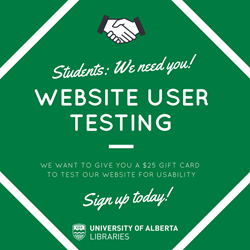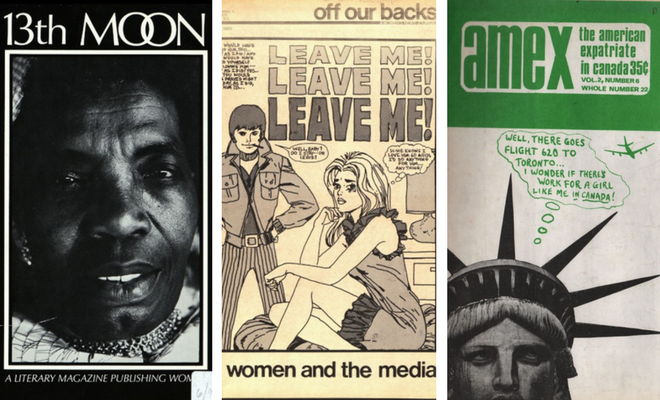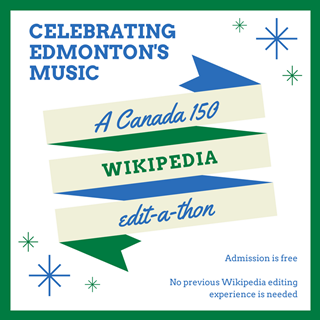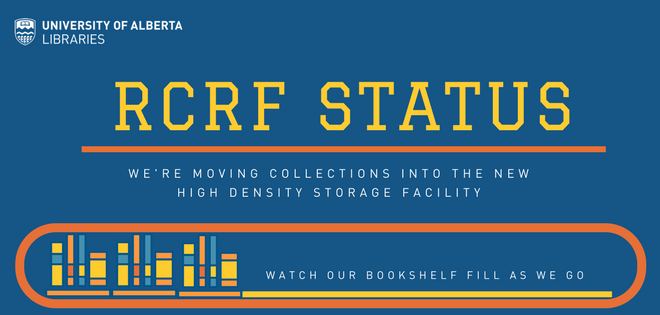Monday, October 30, 2017
Students Needed: Help Us Improve Our Website
The UAlberta Libraries are conducting usability testing on our website, library.ualberta.ca. We are looking for students (undergrad, graduate, PhD) to record their interactions with the site. The session will take about 60 minutes to complete.By participating in this website usability study, you will receive $25 in ONECard cash. To apply, please complete this form and you will be contacted if selected.
Welcome COMPASS: The Student Anthropology Journal of Alberta
Sonya Betz
Monday, October 30, 2017
graduate students
,
journals
,
open access
,
students
No comments
:

On October 16, we welcomed a brand new publication into the world! COMPASS: The Student Anthropology Journal of Alberta published its inaugural issue, featuring articles from undergraduate, MA, and PhD research of students at the University of Alberta, MacEwan University, and the University of British Columbia, spanning topics as diverse as investigating the possibility of celiac disease in Ancient Rome, to using fossils to identify the origin of stone tools in southern Alberta.
We interviewed the Editors-in-Chief of COMPASS, Katherine Bishop and Victoria van der Haas, both PhD Candidates in Anthropology at the University of Alberta, about the value of student journals.
__________________
Why do you think student journals are important?
Victoria: For me, students journals are important for two reasons: experience and learning. This goes for the writers as well as the people behind the journal. It allows students to explore and share research is a non-threatening environment, which is so important for their growth and development in academia. In addition, it also provides them with a bit of exposure.
Katherine: I love working with student journals; they provide so many different opportunities. As an author you learn how to work with feedback. You get a taste for publication in a low-stakes environment and get a final product that looks impressive on a resume. It allows you to grow as a researcher and experience one of the processes that professionals in our field must go through as part of their careers. As a reviewer it will also improve your writing, reading, and ability to give constructive feedback.
What have you learned from your work on student journals?
Victoria: The most important thing I learned is just how much work actually goes into putting together a journal. It seemed like a very straightforward process, but there were more steps involved than I initially assumed. It taught me the importance of time management.
What advice would you give to students who are interested in starting or volunteering for a student journal?
Victoria: Make sure you commit and you have the time to do it. As interesting and exciting as it is to start such an endeavour, you must realize nothing will happen if you don't put in the work. It will take time to review a paper, send it back to the author(s), review it again, copy-edit, etc. COMPASS started a year ago, but only now are we able to put out our first issue. Teamwork matters!
Katherine: If you have the time and are interested in becoming a better writer, editor, and reader of different works – just do it! The UofA’s campus is an incredible environment to help you get involved and succeed with your initiatives. There are lots of different student journals on campus that are always looking for people to help them. If there isn’t one that relates to your research, consider starting your own. That is what happened with COMPASS. We reached out to our department’s library liaison and he soon put us in contact with Sonya Betz, Digital Initiatives Projects Librarian. Not only that, but by contacting other student journals we were able to see what did or did not work for them. The Journal community is very supportive and a great resource.
Anything else you want to say about journal publishing?
Katherine: Work with people that you enjoy. People who have similar work ethics, goals, and understandings. My Co-Editor has been a huge help during stressful times throughout our project. Being on the same page about what we wanted to accomplish, how, and recognizing that this was a “for fun” volunteer initiative went a long way for our continued success together.
Victoria: Enjoy what you do. Everything will be a lot easier if you treat it as a fun side-project, not a job. As a student you'll always have a million things going on, so you need to make sure this isn't just another "chore".
_______________
In addition to COMPASS, the UofA Libraries supports several actively publishing student journals through its open access journal publishing service, including:
For more information about the Libraries’ free open access journal hosting service, please contact Sonya Betz, Digital Initiatives Projects Librarian (sonya.betz@ualberta.ca).
Thursday, October 26, 2017
Spotlight on OER
Sonya Betz
Thursday, October 26, 2017
OER
,
open access week
,
open educational resources
No comments
:
Our friends at the Centre for Teaching and Learning are celebrating Open Access Week too! We asked them to share this guest post on Open Educational Resources for today's OAWeek post.Spotlight on OER
 Krysta McNutt, OER Project Manager, Centre for Teaching and Learning
Krysta McNutt, OER Project Manager, Centre for Teaching and LearningOER (open educational resources) are teaching and learning materials that allow free use and reuse, without charge. OER often have a Creative Commons license that states specifically how the material may be used, reused, adapted, and shared.
OER can unlock freedom and creativity in the classroom. Instructors are exploring the use of OER to reduce textbook costs, customize activities and assignments, increase engagement with learning materials, and even co-create resources with students. Adapting and sharing OER also builds community among educators and scaffolds collaborative practice.
Using OER in place of a textbook or other proprietary learning material opens the door for student agency in how they consume this material (for example, students may re-format the content in a way that is more palatable to their learning preference), and the opportunity for instructors to facilitate activities such as non-disposable assignments.
David Wiley’s 5Rs are frequently cited as defining traits of OER.
OER can unlock freedom and creativity in the classroom. Instructors are exploring the use of OER to reduce textbook costs, customize activities and assignments, increase engagement with learning materials, and even co-create resources with students. Adapting and sharing OER also builds community among educators and scaffolds collaborative practice.
Using OER in place of a textbook or other proprietary learning material opens the door for student agency in how they consume this material (for example, students may re-format the content in a way that is more palatable to their learning preference), and the opportunity for instructors to facilitate activities such as non-disposable assignments.
The true power of open comes not from a resource being free of cost but rather from the freedoms to reuse, retain, redistribute, revise, and remix content. These freedoms empower both students and faculty while widening access and supporting the democratization of education. (Jhangiani).Using OER allows educators to customize content to increase relevancy and ensure inclusivity. By sharing educational material “in the open” with open licensing, the impact reaches beyond students at the University of Alberta by increasing accessibility and availability to informal and lifelong learners.
David Wiley’s 5Rs are frequently cited as defining traits of OER.
 |
| Credit: Image by BC campus, CC-BY 4.0 |
Wiley states: “Open educational resources are defined as “any copyrightable work that is licensed in a manner that provides users with free and perpetual permission to engage in the 5R activities”.
Open Licensing your educational content is one way instructors can get started with OER. AASUA members retain the copyright in the course materials they create and assign an OER-compatible licence. The copyright status on your work does not change when a standard open licence is assigned, such as Creative Commons.
1. Choose a licence
2. Mark the work with the CC icon
3. Link icon to licence deed (e.g. https://creativecommons.org/licenses/by/4.0/)
4. Include a statement.
1. Choose a licence
2. Mark the work with the CC icon
3. Link icon to licence deed (e.g. https://creativecommons.org/licenses/by/4.0/)
4. Include a statement.
Example:
This work is licensed under a Creative Commons Attribution 4.0 International License.
Revising and remixing content is the key to OER. By revising and remixing educational materials, instructors can customize and tailor their instructional materials to meet their students’ needs. By requiring students to revise and remix this content as assignments, instructors can create unique learning experiences, encourage discussion, debate, and uncover new perspectives.
Finding OER
Three common methods to discover OER is through the Creative Commons, BCcampus, or OER Commons websites. However, these are just three of many other ways.
The chart below can be helpful in determining what and how a selected OER may be used. For example, if you select a resource which carries a CC-BY-SA license, you may engage in all 5Rs but you must revise and remix the resource only with content which is also of the same license (CC-BY-SA).
 |
| Credit: Image “Wiley’s 5Rs and Creative Commons Licensing” by Krysta McNutt, CC-BY 4.0 (to view the full version, click here) |
If you’re interested in exploring OER further, whether it is to adapt existing work, adopt it into your course, or create new content, the Libraries and CTL are here to help!
Your Subject Librarian can be a great starting point. You may also want to check out the CTL Open Education page and consider booking a consultation, read more on the open education movement on the UA Libraries Open Education libguide, or join the UofA OE Interest Group.
Upcoming Workshops
- Speedy Intro to Open Education (webinar) October 27, 2017, 9:00am - 10:00am
- Finding, Creating, and Using OER (CTL) November 7, 2017, 12:00pm - 1:00pm
Further Information
McNutt, K., Wakaruk, A. (2017), “Speedy Intro to Open Education”, Centre for Teaching and Learning, University of Alberta, October 24, 2017, https://docs.google.com/presentation/d/1uwU_vRxUXMAdS3nqtVAm4Ffg-gqjMdM98Oc_F0iCiDs/view
Wiley, David. “Defining the "Open" in Open Content and Open Educational Resources.” Iterating toward open, https://opencontent.org/definition/
Wednesday, October 25, 2017
Explore the Radical Resources of the Past: dissidents, activists, and advocates
Independent Voices: An Open Access Collection of an Alternative Press provides access to periodicals produced by feminists, dissident GIs, campus radicals, Native Americans, anti-war activists, Black Power advocates, Hispanics, LGBT activists, the extreme right-wing press and alternative literary magazines during the latter half of the 20th century. It includes titles like:
- 13th Moon
- Amex American Expatriate in Canada
- Off Our Backs
- Vietnam Veterans Against the War
- Freedomways
Open Library of Humanities supports academic journals from across the humanities disciplines, including:
- ASIANetwork Exchange
- Digital Medievalist
- Comics Grid: Journal of Comics Scholarship
- Le foucaldian
- Laboratory Phonology
- Studies in the Maternal
- Open Library of Humanities
Tuesday, October 24, 2017
UAlberta Libraries: Open in Order to …

This week we’re celebrating Open Access Week 2017! The theme this year is “Open in order to _____”, so we thought we’d take some time to highlight some of the ways we support open access all year long.
The University of Alberta Libraries supports open in order to…
-make results of our researchers’ hard work available and visible to everyone, including other researchers, policy-makers, practitioners, students, and the general public,
-contribute to fair and equitable access to information for the widest possible audience,
-reduce the costs of education for students, and
-remove barriers to sharing and reusing research.
What are some of the ways we do this?
Our people:
We are experts in “open.” Our team helps researchers and students across the University navigate the world of open access, open data, and open education. Watch for workshops and events, or contact your subject librarian with specific questions. Throughout the Libraries, supporting open access, open data, and open education through our many diverse roles - from copyright and licensing expertise, to metadata and discovery work - is part of what we do every single day.
Our open access institutional repository:
 The University of Alberta’s institutional repository, ERA: Education and Research Archive (and ERA A+V) provides free and open access to the University of Alberta’s intellectual output, including journal articles written by UofA researchers, theses and dissertations by UofA graduate students, reports, conference proceedings, posters, datasets, and more.
The University of Alberta’s institutional repository, ERA: Education and Research Archive (and ERA A+V) provides free and open access to the University of Alberta’s intellectual output, including journal articles written by UofA researchers, theses and dissertations by UofA graduate students, reports, conference proceedings, posters, datasets, and more.ERA is an easy, convenient, and no-cost way for faculty to make their research open! For help depositing your work in ERA contact erahelp@ualberta.ca.
Our open publishing and digitization initiatives:
For more than 10 years, the UofA Libraries have been publishing open access journals, and now provide free-of-charge journal hosting for any open access Canadian journal. This service has expanded to include more than 45 titles, representing a diverse range of subject areas, from important local and Canadian journals to student and community publications. Using the open source software, Open Journal Systems, we've helped editorial teams publish thousands of articles, all freely accessible for researchers, policy makers, practitioners, and students around the world.
We also have been working hard to make important materials from our collections and partner libraries open and available through an extensive digitization program. Our Peel’s Prairie Provinces website hosts thousands of historic photos, newspapers, books and pamphlets we’ve digitized. Many collections once hidden on our shelves are now available online, open and free for anyone.
Open data:
Not only do we share our own data, such as expenditures, metadata, and usage statistics, we also help researchers find and use open datasets, and provide them with the tools to share their own data with others. You can find many UofA researchers’ datasets in our data repository Dataverse and we have been important partners in major national research data initiatives like Portage, promoting shared national stewardship of data resources.
Spend Halloween Raiding the Rawlinson
Erin Sanderman
Tuesday, October 24, 2017
events
,
Halloween
,
Rawlinson
,
special collections
No comments
:
Tricks and treats are afoot at the Halloween edition of Raiding the Rawlinson... Staff at the John W. Scott Health Sciences Library have unearthed another cavalcade of weird and wonderful texts from the Rawlinson Rare Book Collection to tantalize antiquarian tastes. Explore the secrets of nineteenth century alternative knowledge systems including mesmerism and phrenology. Learn about some of the early strategies medical professionals used to rebuild broken bodies, including the wonders of First World War plastic surgery - not for the faint of heart!
Visit the Scott Library between 11:30am and 1:30pm on October 31 to get up close and personal with these fascinating, far-out folios.
Monday, October 23, 2017
Celebrating Open Access Week!
Every year, universities, colleges, research institutes, and libraries around the world host events celebrating Open Access Week, an opportunity to explore and promote open access in its many different forms. This year's Open Access Week runs from October 23 - 29. The theme, "Open in order to ..." is an invitation to answer the question of what concrete benefits can be realized though open access.
We've put together a list of our top picks for FREE events happening here at the UofA, and online. Find many more on the global 2017 OA Week Calendar, or follow #openaccessweek2017 on Twitter.
Tuesday, October 24
At the UofA11:30 am - 12:30 pm Scholarly Communications Workshop, CAB 345, University of Alberta
Join UofA librarians Alison Henry and Victoria Wong for a session on tools for collaborative work, open data and OA publishing.
Details and registration
12:00 - 1:00 pm Speedy Introduction to Open Education, 5-02D, Cameron Library, University of Alberta.
Details and registration
Online
8:30 - 10:00 am Fair, Open Free? Copyright, Open Licensing, and Academic Freedom in Canada Panelists: Ariel Katz, Jennifer MacInnis, Sam Trosow, Kelsey Merkley
Details and livestream from Ryerson University
10:30 - 11:40 am Keynote: Spotlight on Open Educational Resources Michael Geist
Details and livestream from Ryerson University
11:00 am - 12:00 pm What we talk about when we talk about Open Access
Webcast from the Association of College and Research Libraries
Details and registration
12:00 - 3:30 pm Open in order to … end extreme poverty
World Bank and OA Panel, Livestreamed from World Bank HQ in Washington, DC.
Details and livestream
At MacEwan University
11:00 am-3:00 pm Celebrating Edmonton’s Music: A Canada 150 Wikipedia Edit-a-thon
John L. Haar Library (multipurpose room 7-269), MacEwan University City Centre Campus 10700 - 104 Ave.
Details and registration
Online
9:00 am - 10:00 am Webinar: Speedy Intro to Open Education
Details and registration
8:30 - 10:00 am Fair, Open Free? Copyright, Open Licensing, and Academic Freedom in Canada Panelists: Ariel Katz, Jennifer MacInnis, Sam Trosow, Kelsey Merkley
Details and livestream from Ryerson University
10:30 - 11:40 am Keynote: Spotlight on Open Educational Resources Michael Geist
Details and livestream from Ryerson University
Wednesday, October 25
Online11:00 am - 12:00 pm What we talk about when we talk about Open Access
Webcast from the Association of College and Research Libraries
Details and registration
Thursday, October 26
Online12:00 - 3:30 pm Open in order to … end extreme poverty
World Bank and OA Panel, Livestreamed from World Bank HQ in Washington, DC.
Details and livestream
Friday, October 27
At MacEwan University Friday, October 27
11:00 am-3:00 pm Celebrating Edmonton’s Music: A Canada 150 Wikipedia Edit-a-thon
John L. Haar Library (multipurpose room 7-269), MacEwan University City Centre Campus 10700 - 104 Ave.
Details and registration
Online
9:00 am - 10:00 am Webinar: Speedy Intro to Open Education
Details and registration
Friday, October 20, 2017
Community and Healing with the Library
I’ve said this before…
Academic libraries are not just about books and research: they’re also about building communities. Oftentimes building a community is about positive relationships and helping people find the tools that they need to succeed.
Sometimes though, the best thing a library can do for a community is give them space to use the tools they already have.
Nantâwihiwêwin: Doctoring; healing day after day for a long time is a project that straddles this line, supporting those who participate to share their own stories, and turn our spaces into their own.
Started by Ambroise Cardinal-Dubitski, an Indigenous student specializing in Kinesiology, explains that Nantâwihiwêwin is:
“a zine that is meant to act as a tool for achieving the highest form of ‘decolonization’ which is to be healthy, resilient and Indigenous, especially while traversing the adversities of institutional learning and living.
[…] Words of empowerment, art, and poetry are on every page to aid the process of healing our physical, mental, emotional, and spiritual selves. Each page is taken as a reminder of our strength, love, and connection to the world as Indigenous Peoples, but also as a challenge. The challenge of healing in a world filled with racism, aggression, and harm towards Indigenous Peoples and people of colour.”
Hearing those words, my first instinct was to help.
Helping is the library way, after all. But how do staff, faculty, and members of an institution help when what students want is to empower, and speak for themselves?
My answer is to offer space, support, and a platform for outreach.
Living in a city with many universities and colleges, there are a lot of Indigenous students receiving an education. This meant that the project needed to extend beyond our University.
So, it has!
Currently, we are engaging students from the University of Alberta and Yellowhead Tribal College, and the hope is to extend the project to Grant MacEwan and other institutions. The Greater Edmonton Library Association (GELA) has also jumped on board: the association is currently working the Remand Centre to bring creative writing workshops to incarcerated peoples.
Nantâwihiwêwin was well received and created a special healing environment for everyone involved.
It leaves us with open hearts and open minds towards the notion of reclamation and healing as a community. If you or anyone you know may be interested in participating, the University of Alberta Libraries is hosting a Zine Making Workshop on October 25, at 2:30pm in the Kiva Room.
If you are unable to make it, you can always create a submission and bring it to HT Coutts Education and Physical Education Library. Otherwise, we look forward to distributing the final zine to everyone in our community.
Kinanâskomitin. “I am grateful to you”.
“Nantâwihiwêwin is a call to action as well as a gentle reminder, a reminder and invitation to the support and connection you have on your journey both internally, externally, spiritually, and physically.”
– Ambrose Cardinal-Dubitski
Thursday, October 19, 2017
Librarians Encourage Reconciliation Through KAIROS Blanket Exercises
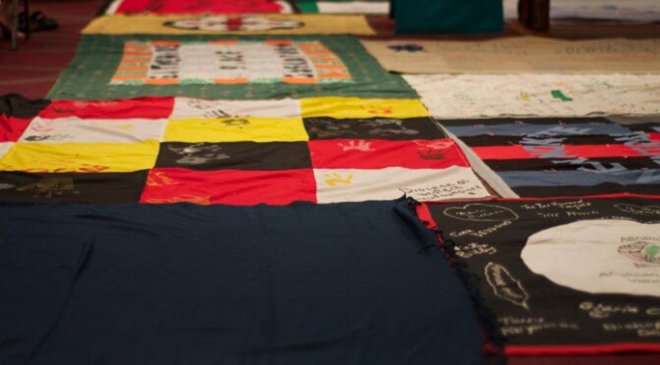 |
| Photo: http://www.holytrinitytoronto.org/wp-content/uploads/2016/02/blankets-672x372.jpg |
As a Métis person and educator, reconciliation is something that is near and dear to my heart. In fact, I have started working with RISE (Reconciliation in Solidarity Edmonton) to gain more understanding of my own family’s past in light of everything that has happened between Canada and Indigenous people. Through this journey, I am often faced with the question of: “how do you encourage reconciliation?” and “what is the most effective way to educate students about Indigenous history?” This is where I came across the KAIROS Blanket Exercise.
So, what is a Blanket Exercise?
I’ve been asked this questions many times. Whether it’s a family member at a holiday meal or a friendly conversation in the coffee line up, I always say the same thing. It’s a way to educate people on a topic that not everyone is fully aware of -- a way to present Canadian history from an Indigenous perspective.
This is a perspective that has been muted throughout history. In fact, remembering my elementary school days, I don’t recall learning much about Indigenous culture. To be honest, I think we spent more time talking about pirates than Indigenous Peoples. My own family history was muted as well. We were actively told to hide our true identity as a survival mechanism. This left me and my generation grossly unaware of the struggles that Indigenous Peoples have dealt with for more than 150 years.
The KAIROS Blanket Exercise is an excellent tool for building a more accurate image of how Canada came to be what it is now. Through an interactive script that engages all participants, it takes participants through time prior to any European settlers setting foot on Turtle Island. By immersing yourself into the activity, every participant feels the impacts that the Canadian government continues to have on Indigenous Peoples.
Now, what does this have to do with the library?
This is a tough, but wonderful question. Librarians are not all about books and databases. I see librarians as educators, activists, and helpers. Most important, libraries are a place of community. So, if a student and/or faculty member walks into the library I instinctively want to help.
This is what happened with EDU 211: Aboriginal Education and Contexts for Professional and Personal Engagement. A friendly conversation about library services evolved into a personal conversation about my involvement with RISE and my role in facilitating Blanket Exercises. It was the perfect combination of relationships and willingness to try new things in the classroom. Since that initial conversation, librarians gathered to help!
We gathered together in the Education Kiva room to share the exercise with 60 students and future educators. Since this initial Blanket Exercise, I have been asked to facilitate more within the Education community.
I am extremely grateful and humbled by the experience and being able to share my story with the students. By sharing these moments with the University community, I hope that this will help to inform future generations of instructors and students.
I am extremely grateful and humbled by the experience and being able to share my story with the students. By sharing these moments with the University community, I hope that this will help to inform future generations of instructors and students.
Hiy hiy.
Wednesday, October 18, 2017
Sleep for Success Exhibit: On Now
Earlier this year, Yuluan and Vineet were awarded a Heroes for Health grant for their proposal to raise awareness of the effects of sleep on health. As a part of this initiative they have created an eClass course called Dream Big, Sleep Tight, where members of the UofA community can learn about the perils of sleep deficiency and how to combat it.
To help promote this course and the overall importance of sleep, Yuluan and Vineet have put together an exciting new exhibit at the John W. Scott Health Sciences Library. Exploring everything from hidden sources of caffeine to gadgets that can help and harm sleep this exhibit has plenty of solutions to help you catch the Zzzs you need to help you succeed. The Sleep for Success Exhibit will be hosted at the Scott Library from October 16 until November 19, 2017.
Tuesday, October 17, 2017
David Sulz Awarded Excellence in Learning Support
“David has been a catalyst for my learning. I wish every grad student on campus could benefit from his presence or their own subject librarian during their learning journey...” - Yichuan Wang, Ph.D. student in Resource Economics and Environmental Sociology, one of the Award nominators.
University of Alberta Librarian David Sulz is known for his enthusiasm for learning and inspiring that in others. He listens to students, creates a safe environment, and is an active learning partner.
 |
| David Sulz and Yichuan Wang |
Recently, he was recognized for these qualities and awarded the UAlberta Excellence in Learning Support. This award is specifically designed to recognize members of the University community whose role does not involve teaching, but who nonetheless directly and significantly contribute to the student learning experience.
Those who nominated David for his excellence in learning support were graduate students, colleagues, and professors. Each mentioned David’s enthusiasm for learning and his role as a connector of students. He creates a very fun and safe space for struggle with idea formation and an atmosphere where the struggle is embraced as an exciting growth opportunity. His joyful personality, life wisdom, and listening skills make him an active catalyst for learning and great conversation partner.
He uses alternative techniques to engage students and researchers to think differently about their subject and get excited about their learning. Whether he’s suggesting mind maps or encouraging students to explain their research in a sentence or two to a group of high school students touring the library, David makes learning fun.
Congratulations David!
Monday, October 16, 2017
Celebrate Edmonton Music: Wikipedia Edit-a-thon
Admission is free and no previous Wikipedia editing experience is required.
Location
John L. Haar Library (multipurpose room 7-269)
MacEwan University City Centre Campus
10700 104 Avenue Northwest
Edmonton, AB T5J 4S2
Schedule
11am-12pm: Part One: Wikipedia Basics
12pm-1pm: Lunch
1pm-3pm: Part Two: Hands-on editing of Edmonton music articles
Register on Eventbrite by Tuesday, October 18.
Wednesday, October 11, 2017
Archives Move to the New RCRF Begins
The University of Alberta Archives has begun its move to our new high-density storage facility, the RCRF (Research and Collections Resource Facility).The archives move involves the packing and moving of 31,477 boxes of materials or 1028 book carts. The move is expected to take 2 months. During the move, the archives collection is unavailable. For more information, please contact Archives (archives@ualberta.ca).
Friday, October 6, 2017
Library Updates: You asked, we listened!
In response to student feedback through the Student Library Advisory Committee (SLAC) and informal channels, look for the following changes in Libraries this fall:- Introduction of food-free zones in some silent study spaces at Cameron, Rutherford, and Augustana.
- Loan periods for laptops & cameras have increased to 48 hours.
- Addition of lockable cell-phone charging stations at most library locations.
Have a wonderful Fall Term!!
Subscribe to:
Comments
(
Atom
)

